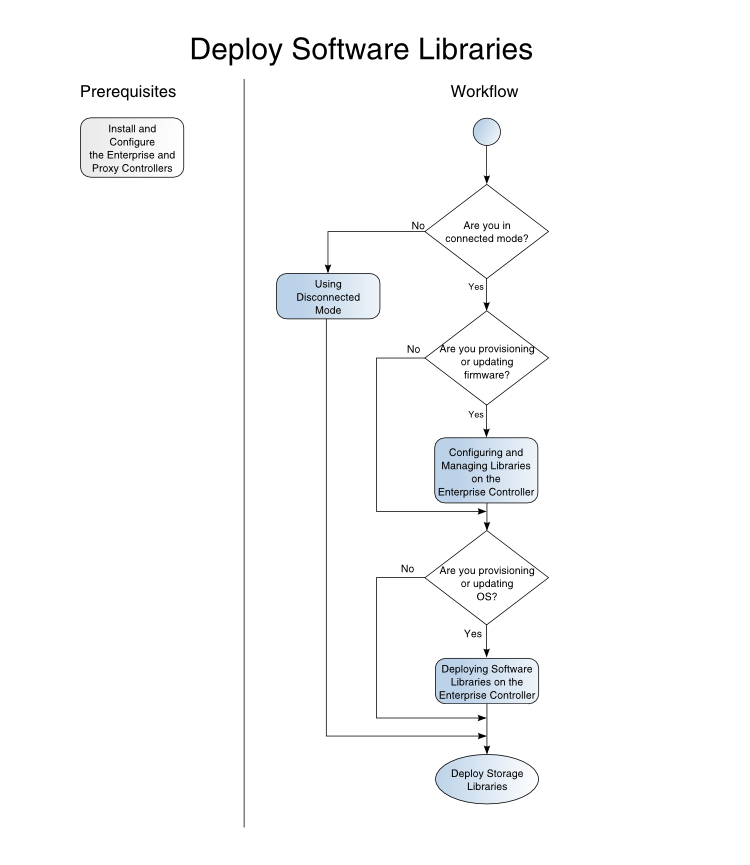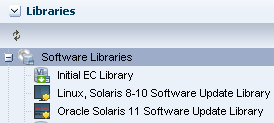Oracle® Enterprise Manager Ops Center
Deploy Software Libraries Workflow
12c Release 3 (12.3.0.0.0)
E59977-01
June 2015
This workflow provides an end-to-end example for how to use Oracle Enterprise Manager Ops Center.
Introduction
Workflows are divided into two categories: Deploy and Operate. Each workflow is a compilation of several examples.
This workflow shows how to use Oracle Enterprise Manager Ops Center to deploy the libraries that you will use for provisioning and updating operating systems and provisioning and updating firmware. After installing and configuring the software, this is the first workflow in the Deploy series.
Software libraries store the operating system images for provisioning, branded images, Flash Archives (FLARs), firmware, profiles, operating system updates, custom programs and scripts. Figure 1 shows the possible types of software libraries that are created when you install and configure Oracle Enterprise Manager Ops Center.
-
Initial EC Library: A local software library that is created when the product is installed and configured. As a storage administrator, you can create more software libraries to store images and organize them for your site's purposes. You can create and configure the library to be a local file system on the Enterprise Controller or a mount point on an NFS server. At any time, you can specify one of them as the EC Library.
-
Linux, Solaris 8-10 Software Update Library: A local software library that includes OS images and metadata, such as package dependencies, package compatibilities, withdrawn updates, and deployment rules. During installation, Oracle Enterprise Manager Ops Center creates a local software library and establishes the connection to the Oracle Knowledge Base so that you can update the library contents.
-
Oracle Solaris 11 Software Update Library: A local Image Packaging System (IPS) repository that includes OS images and metadata, such as package dependencies, package compatibilities, withdrawn updates, and deployment rules. This library is only created if the Enterprise Controller is installed on an Oracle Solaris 11 operating system. During installation a connection is established between the library and the Oracle Solaris 11 Package Repository so that you can update the library contents.
Required Permissions and Roles
The following permissions and roles are required to complete the tasks in the workflow:
-
Asset Admin to discover hardware and storage
-
Plan/Profile Admin to create and manage profiles and plans
-
Storage Admin to create, configure, and manage libraries
Workflow
Before you begin this workflow, ensure that Oracle Enterprise Manager Ops Center is installed and configured.
Note:
If you plan on provisioning or updating Oracle Solaris 11, the Enterprise Controller and a Proxy Controller must be installed on Oracle Solaris 11. The Proxy Controller must be on the same subnet as the assets to be provisioned.The workflow in Figure 2 shows the prerequisites on the left and the tasks and decisions on the right. The first decision in the workflow is determining if you are operating the software in connected or disconnected mode. Connected mode means that Oracle Enterprise Manager Ops Center is connected to the Internet.
The following documents are referenced in Figure 2:
-
Install and Configure the Enterprise and Proxy Controllers. See
Oracle Enterprise Manager Ops Center Installation Guide for Linux Operating SystemsorOracle Enterprise Manager Ops Center Installation Guide for Solaris Operating Systems.
Figure 2 Deploy Software Libraries Workflow

Description of "Figure 2 Deploy Software Libraries Workflow"
What's Next?
At the end of this workflow, software libraries are available to use for provisioning assets. To set up storage libraries for your virtualization hosts or to set up storage libraries for additional software libraries, see the Deploy Storage Libraries Workflow.
See the Deploy Operating Systems Workflow for the procedures to provision Oracle Solaris 10 and Oracle Solaris 11 and see the Operate Hardware Workflow for the procedures to provision firmware.
Related Articles and Resources
See the Oracle Enterprise Manager Ops Center Configure Reference has information about software libraries and storage libraries.
The Oracle Enterprise Manager Ops Center 12c documentation is located at http://docs.oracle.com/cd/E59957_01/index.htm.
For deployment tasks, go to http://docs.oracle.com/cd/E59957_01/nav/deploy.htm and for operate tasks go to http://docs.oracle.com/cd/E59957_01/nav/operate.htm.
Documentation Accessibility
For information about Oracle's commitment to accessibility, visit the Oracle Accessibility Program website at http://www.oracle.com/pls/topic/lookup?ctx=acc&id=docacc.
Oracle customers that have purchased support have access to electronic support through My Oracle Support. For information, visit http://www.oracle.com/pls/topic/lookup?ctx=acc&id=info or visit http://www.oracle.com/pls/topic/lookup?ctx=acc&id=trs if you are hearing impaired.
Oracle Enterprise Manager Ops Center Deploy Software Libraries Workflow , 12c Release 3 (12.3.0.0.0)
E59977-01
Copyright © 2007, 2015, Oracle and/or its affiliates. All rights reserved.
This software and related documentation are provided under a license agreement containing restrictions on use and disclosure and are protected by intellectual property laws. Except as expressly permitted in your license agreement or allowed by law, you may not use, copy, reproduce, translate, broadcast, modify, license, transmit, distribute, exhibit, perform, publish, or display any part, in any form, or by any means. Reverse engineering, disassembly, or decompilation of this software, unless required by law for interoperability, is prohibited.
The information contained herein is subject to change without notice and is not warranted to be error-free. If you find any errors, please report them to us in writing.
If this is software or related documentation that is delivered to the U.S. Government or anyone licensing it on behalf of the U.S. Government, then the following notice is applicable:
U.S. GOVERNMENT END USERS: Oracle programs, including any operating system, integrated software, any programs installed on the hardware, and/or documentation, delivered to U.S. Government end users are "commercial computer software" pursuant to the applicable Federal Acquisition Regulation and agency-specific supplemental regulations. As such, use, duplication, disclosure, modification, and adaptation of the programs, including any operating system, integrated software, any programs installed on the hardware, and/or documentation, shall be subject to license terms and license restrictions applicable to the programs. No other rights are granted to the U.S. Government.
This software or hardware is developed for general use in a variety of information management applications. It is not developed or intended for use in any inherently dangerous applications, including applications that may create a risk of personal injury. If you use this software or hardware in dangerous applications, then you shall be responsible to take all appropriate fail-safe, backup, redundancy, and other measures to ensure its safe use. Oracle Corporation and its affiliates disclaim any liability for any damages caused by use of this software or hardware in dangerous applications.
Oracle and Java are registered trademarks of Oracle and/or its affiliates. Other names may be trademarks of their respective owners.
Intel and Intel Xeon are trademarks or registered trademarks of Intel Corporation. All SPARC trademarks are used under license and are trademarks or registered trademarks of SPARC International, Inc. AMD, Opteron, the AMD logo, and the AMD Opteron logo are trademarks or registered trademarks of Advanced Micro Devices. UNIX is a registered trademark of The Open Group.
This software or hardware and documentation may provide access to or information about content, products, and services from third parties. Oracle Corporation and its affiliates are not responsible for and expressly disclaim all warranties of any kind with respect to third-party content, products, and services unless otherwise set forth in an applicable agreement between you and Oracle. Oracle Corporation and its affiliates will not be responsible for any loss, costs, or damages incurred due to your access to or use of third-party content, products, or services, except as set forth in an applicable agreement between you and Oracle.
